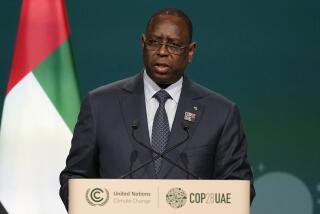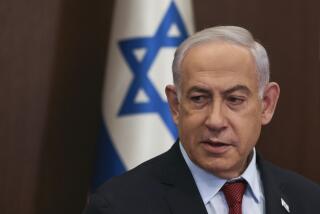Palestinians Indefinitely Postpone Vote
- Share via
JERUSALEM — Saying it is impossible to stage a vote while Israeli troops and tanks occupy the major cities and towns of the West Bank, Palestinian officials on Sunday indefinitely postponed a general election that had been scheduled for Jan. 20.
“We cannot hold elections while under occupation,” said Palestinian Information Minister Yasser Abed-Rabbo, announcing the decision after a gathering of top Palestinian officials in the West Bank town of Ramallah.
The postponement of what would have been the first Palestinian general election since 1996 had been widely expected, but it nonetheless cast a pall over prospects for reforms within Yasser Arafat’s Palestinian Authority.
Arafat has been under virtual house arrest in his shell-pocked Ramallah headquarters since late May, and the governments of both Israeli Prime Minister Ariel Sharon and President Bush have refused to engage in dealings with him.
Israel said Sunday that it bore no responsibility for the delay in balloting.
“It is not the Israeli presence, but the fact that Yasser Arafat refuses to engage any actions that could lead to peace,” said Sharon advisor Raanan Gissin.
The election date was chosen in September, largely in response to pressure from the U.S. but also amid growing internal calls for change. At the time, Palestinian anger over corruption and inefficiency in Arafat’s government had begun to resurface after being pushed aside amid the crisis atmosphere that characterized the first months of the current Palestinian uprising, or intifada, which began in September 2000.
The Bush administration had made it clear that it hoped the vote would result in a leadership change. “Peace requires a new and different Palestinian leadership so that a Palestinian state can be born,” Bush said in a key speech in June, though he did not mention Arafat by name. “I call on the Palestinian people to elect new leaders not compromised by terror.”
However, over the course of 27 months of bitter fighting, the 73-year-old Arafat’s popularity has tended to surge when he is perceived to be under external threat. His stature among Palestinians has grown whenever Israeli troops have invaded his Ramallah compound.
Sharon has resisted calls from more conservative members of his government to deport Arafat. Although the prime minister has a long and bitter personal history with Arafat and has said privately that he would like nothing better than to expel him, he is thought to be acceding to U.S. wishes that he refrain from inflaming passions in the Arab world in the run-up to a potential U.S.-led war with Iraq.
Sharon promised the U.S. months ago that Israel would not hurt or kill the Palestinian leader.
Arafat has said in recent weeks that voting could not be held until at least 30 days, and possibly as long as 90 days, after Israeli troops had withdrawn from the West Bank’s major population centers.
The Palestinian Cabinet said Sunday that elections would not be held until Israeli forces withdrew to positions held before the outbreak of fighting in 2000. Israel says any decision about troop movements will be dictated solely by its own security needs.
The army moved into the West Bank in force after a particularly deadly wave of suicide bombings in Israeli cities in June, and it has maintained an intermittent presence in and around major Palestinian cities and towns since then. Tight curfews impede travel within and between cities and towns. Many people find it extremely difficult to get to work and school, or to visit family members.
In recent weeks, soldiers have been staging pinpoint raids that have resulted in the arrests of hundreds of Palestinians wanted in connection with planning attacks against Israel.
The Palestinians held their first and only popular vote for the presidency and the Legislative Council, or parliament, in 1996.
Arafat won overwhelmingly then, and polls had suggested that despite deep unhappiness with their lot, Palestinians would probably have again supported him for president.
Many ordinary Palestinians say that even if they are dissatisfied with Arafat’s leadership, they do not wish to be dictated to by the United States or Israel.
Word of the delay in elections came as Palestinian leaders were scrutinizing the latest draft of a “road map” aimed at achieving a negotiated settlement to the violence.
The U.S. has reportedly differed with its so-called Quartet partners -- the European Union, Russia and the U.N. -- over some provisions of the plan, as well as the timing of its formal presentation to the parties.
The initial Palestinian response to the draft proposals was lukewarm.
Abed-Rabbo, the information minister, on Sunday called them “not bad, but not good enough.”
More to Read
Sign up for Essential California
The most important California stories and recommendations in your inbox every morning.
You may occasionally receive promotional content from the Los Angeles Times.













